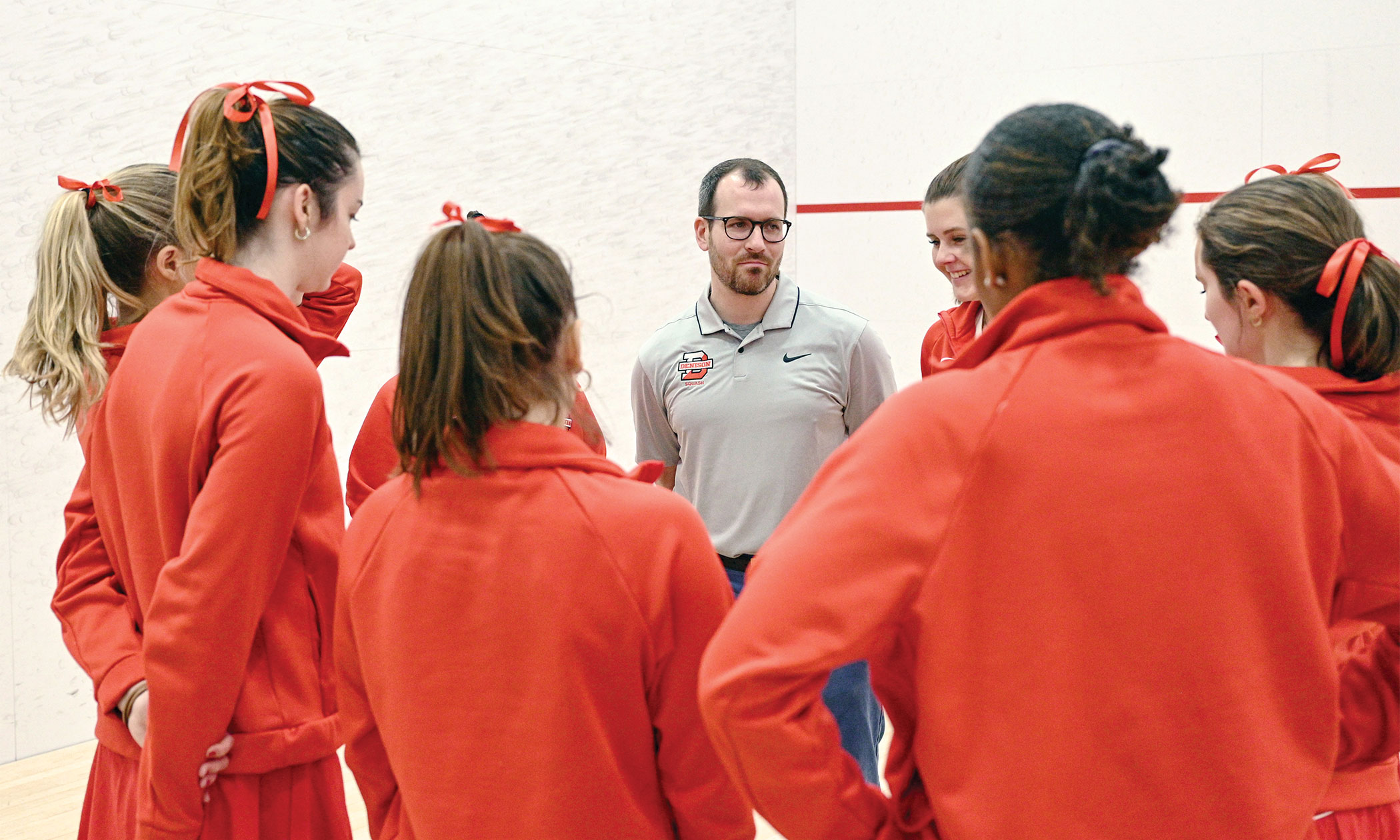Denison’s new squash coach, Michael MacDonald ’09, didn’t have much time to settle in last season. The former head coach at Connecticut College arrived from the East Coast just three hours before his first practice.
In the following months, he took a one-win women’s team to a 9-8 overall record — earning recognition as the women’s squash coach of the year in the Liberty League in the spring of 2023. (It was actually for coaching staff of the year, but MacDonald comprises the whole staff.)
“It was an honor to be recognized so early in my tenure,” MacDonald says. “The honor reflects the student athletes, strength and conditioning coaches, and athletic trainers who have also been committed to this growth process.”
The fledgling sport of squash might not have the same instant recognition as more familiar standbys like tennis and volleyball. For some, “squash” indicates a fruit or vegetable — not a vigorous athletic contest featuring racquets and a small rubber ball.
But as the squash program grows at Denison — the university fielded both men’s and women’s varsity teams in the 2021-22 school year — the game is also growing nationwide. It’s not an official NCAA sport yet, but it’s overseen by the College Squash Association, which has 32 women’s teams as members. Many of the top programs are based in the Northeast.
The concept of the game of squash is familiar, even if people aren’t aware of the rules. At its most basic level, it’s a volleying contest like tennis, volleyball, or pingpong. But in this case, players dart around a court in a small room, where the walls are fair game for ricochet shots.
Women’s junior captain Charlotte Sigg ’25, whose first year at Denison was also the varsity team’s first campaign, says about half the people she meets don’t know what squash is. She finds herself explaining it.
“I feel like once you try it, you’re not going to be able to go back to whatever other sport you were playing.”
“I feel like once you try it, you’re not going to be able to go back to whatever other sport you were playing,” says co-captain Antoinette Ramsey ’25.
They say the sport requires fast reflexes, good hand-eye coordination, and confidence while playing in a tight space and maneuvering around the opponent.
MacDonald calls it a demanding, and very explosive, game.
“It’s really physical. You get a really nice workout,” Ramsey agrees.
The emergence of squash as a varsity sport reflects a growing athletic program at Denison, where MacDonald played club squash as a student.
“The experience for the student athletes is a lot different than it was when I was a student here,” he said. “We’ve got the strength coaches, we’ve got the athletic trainers. It’s adding to the experience the students are having now.”
The embrace of varsity squash also puts Denison front and center in expanding the reach of squash in the Midwest. Sigg, who hails from Connecticut herself, notes that the Denison team is constantly traveling to states such as Massachusetts, Pennsylvania, and Virginia to play.
Former coach Pam Anckermann established a good foundation for the program, MacDonald says, and he has worked to identify the strengths and weaknesses of the players and help them get to the next level.
MacDonald is easygoing, Ramsey says, but tough when he needs to be, and has been able to push players to achieve more.
Part of the team’s improvement came from motivation, mental health, and focus, Sigg says. MacDonald “really emphasized how we should put everything on the court, because if you’re stressed about something, or you have an essay due later that night, you can’t do anything about it when you’re playing.”
It’s a lesson the team took to heart, she says, and they’ve gelled as well. “Our team has just gotten so much closer. And we’re always cheering each other on.”
This year will mark a transition, MacDonald predicts, as quite a few seniors graduated and the coaching change disrupted the recruiting process. The Covid pandemic didn’t help. The varsity team’s first official season was actually 2020-21, but they didn’t play any games.
MacDonald is lining up recruits and says the program is set to continue to improve. He’s glad to be building the team at his alma mater, where his wife also attended.
“I know there’s been a lot of families and alums throughout the years that have been pushing hard not only for the men’s club team to go varsity, but also to add a women’s team and to help that go varsity as well,” he said. “So it just feels really good to be here.”


